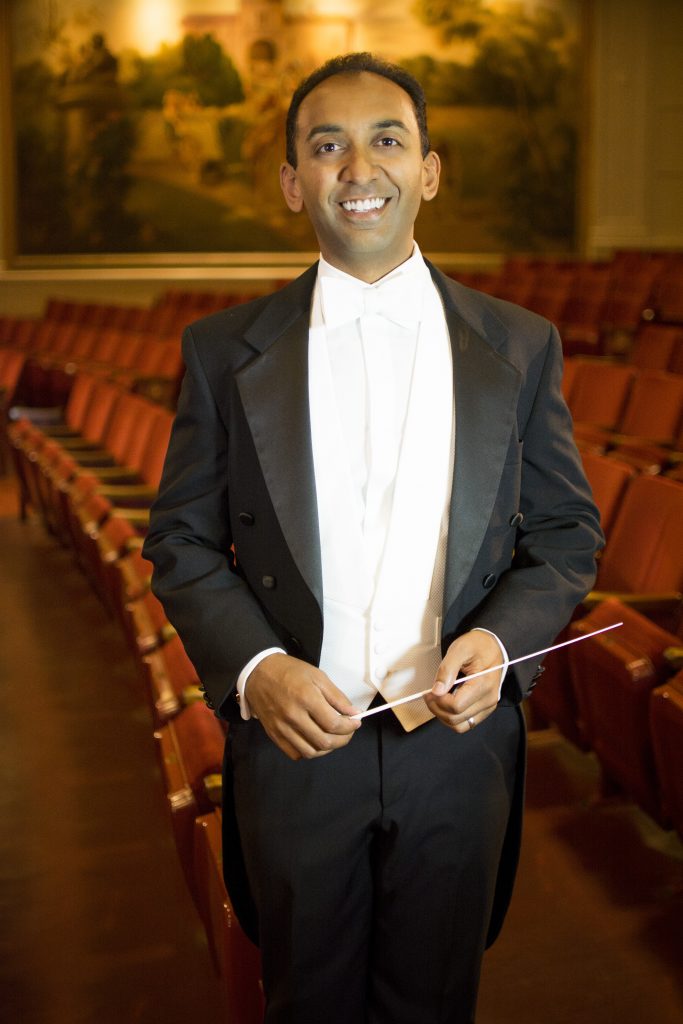Feast of Russian Music Crowns San Diego Symphony’s Summer Season at Embarcadero Marina Park South
The ritual of culminating the San Diego Symphony Summer Pops season with canons and fireworks punctuating Tchaikovsky’s “1812 Overture” is too much fun for everyone involved to give it up, so, of course, Associate Conductor Sameer Patel followed tradition, playing it to the hilt Friday (August 31) at Embarcadero Marina Park South.
However, the real challenge is to plan the rest of the concert so the audience has not become flooded with so much of that great Russian composer that the “1812 Overture” sounds old hat. Patel wisely modified the usual all-Tchaikovsky format to include a variety of other Russian composers to complement the melodic genius and orchestral wizardry of Piotr Ilyich.On the program’s first half, the young American pianist Andrew Staupe gave a sparkling, beautifully nuanced account of the opening movement of Sergei Rachmaninoff’s beloved Second Piano Concerto. In the 2014 La Jolla SummerFest, Staupe made an excellent impression, especially in Dmitri Shostakovich’s profound E Minor Piano Trio, and his Rachmaninoff with the orchestra further demonstrated a technique that sailed through every challenge, yet communicated the score’s emotional depth. The composer marked this opening movement Moderato, and Patel delivered that to the letter. But given that Patel programmed only the concerto’s first movement, a little more urgency and a slightly faster tempo would have made a stronger contribution to his program.
Alexander Borodin’s “Polovtsian Dance No. 17” from his opera Prince Igor is always a pops surefire choice with its voluptuous melodies and exotic air. Although it is unlikely that anyone in the packed audience had ever experienced Prince Igor, including this critic, the work’s main theme is always recognizable, since the 1953 American musical Kismet turned Borodin’s theme into its hit song “Stranger in Paradise.” With Principal Oboe Sarah Skuster and English Horn virtuosa Andrea Overturf exchanging this and other seductive themes with equal finesse, they brought us right to the portal of paradise.
I could split hairs and point out that Aram Khachaturian, whose well-known “Sabre Dance” and three other less familiar selections from his ballet Gayane that Patel so sympathetically conducted, was not Russian, but Armenian. Of course, it was this exotic, eastern-flavored traditional music from the Caucasus region that all the Russian nationalist composers dipped into to flavor their music, and, also, at the height of Khachaturian’s career, he was made Secretary of the Union of Soviet Composers, the most powerful musical position in the former U.S.S.R.
Jon Szanto’s scintillating xylophone solo made the “Sabre Dance” soar, and a pair of guest saxophone players added allure to the composer’s vivid orchestration. “Lesginka,” the final Gayane selection, opened with a terrific trumpet section fanfare and then unfurled a propulsive, dervish-like dance. All of the Gayane movements proved more than simply attractive—I see no reason this ballet should be limited to pops programming.
With sterling fanfares and its intoxicating dance energy, Tchaikovsky’s “Polonaise” from his famous opera Eugene Onegin opened the concert brilliantly. “Capriccio italien,” Patel’s other Tchaikovsky offering in addition to the required “1812 Overture,” seamed to meander listlessly until it approached its flashy climax, but I believe that is more the composer’s fault rather than the conductor’s.
As a special addition to this Russian program, members of two San Diego choral groups, Voices of Our City and the San Diego Master Choral, assembled on stage to sing Sean O’Loughlin’s grand orchestral arrangement of the traditional hymn “Amazing Grace,” which was received with great appreciation by the audience.
In Patel’s introduction to the “1812 Overture,” he mentioned that due to the large battery of canons used (they fire from the far edge of the concert seating section over the bay), audience members might wish to shield their ears. Sure enough, before Patel picked up his baton, he inserted his earplugs. Aided by members of the San Diego State University Marching Aztecs—with all ten Sousaphones forming an impressive phalanx across the front of the stage—Patel and the orchestra gave a noble, thoughtful account of the familiar tone poem.
Yes, the canons were ear-splitting and the fireworks less than spectacular. But Patel and the musicians made Tchaikovsky’s music the most important part of the spectacle, and for we can all be thankful.
The San Diego Symphony presented this program, “1812 Tchaikovsky Spectacular,” at Embarcadero Marina Park South August 31 through September 2, 2018. The Friday, August 31, performance was attended for this review. The San Diego Symphony season resumes at the Jacobs Music Center in downtown San Diego on October 4, 2018.

Ken Herman, a classically trained pianist and organist, has covered music for the San Diego Union, the Los Angeles Times’ San Diego Edition, and for sandiego.com. He has won numerous awards, including first place for Live Performance and Opera Reviews in the 2017, the 2018, and the 2019 Excellence in Journalism Awards competition held by the San Diego Press Club. A Chicago native, he came to San Diego to pursue a graduate degree and stayed.Read more…

